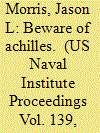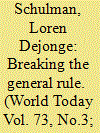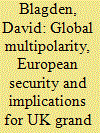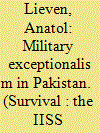| Srl | Item |
| 1 |
ID:
130399


|
|
|
| 2 |
ID:
155661


|
|
|
| 3 |
ID:
156734


|
|
|
| 4 |
ID:
121666


|
|
|
|
|
| Publication |
2013.
|
| Summary/Abstract |
After five decades in which military dominance defined post-colonial politics, Burma has recently embarked on a long-delayed process of political reform. The gradual democratisation of the country's political institutions has meant that the history of its two twentieth-century coups is increasingly overlooked. This article presents a focused study of military interventionism in Burma and offers explanations for the successful entrenchment of military rule. The mindset of the military leadership and its success at sidelining opponents is explored alongside a preliminary consideration of the role that international support has played. Crucially, military leaders have been exasperated by what they consider feeble (and foreign-controlled) civilian authorities that have been incapable of preventing national fragmentation. This mindset, plus effective repression and support by neighbouring countries such as China, formed the basis of the military's rule. Therefore, the prospects of future democratisation efforts will rely on a fuller understanding of the processes that led the armed forces to exert consistent dominance.
|
|
|
|
|
|
|
|
|
|
|
|
|
|
|
|
| 5 |
ID:
138350


|
|
|
|
|
| Summary/Abstract |
The international system is returning to multipolarity—a situation of multiple Great Powers—drawing the post-Cold War ‘unipolar moment’ of comprehensive US political, economic and military dominance to an end. The rise of new Great Powers, namely the ‘BRICs’—Brazil, Russia, India, and most importantly, China—and the return of multipolarity at the global level in turn carries security implications for western Europe. While peaceful political relations within the European Union have attained a remarkable level of strategic, institutional and normative embeddedness, there are five factors associated with a return of Great Power competition in the wider world that may negatively impact on the western European strategic environment: the resurgence of an increasingly belligerent Russia; the erosion of the US military commitment to Europe; the risk of international military crises with the potential to embroil European states; the elevated incentive for states to acquire nuclear weapons; and the vulnerability of economically vital European sea lines and supply chains. These five factors must, in turn, be reflected in European states’ strategic behaviour. In particular, for the United Kingdom—one of western Europe's two principal military powers, and its only insular (offshore) power—the return of Great Power competition at the global level suggests that a return to offshore balancing would be a more appropriate choice than an ongoing commitment to direct military interventions of the kind that have characterized post-2001 British strategy.
|
|
|
|
|
|
|
|
|
|
|
|
|
|
|
|
| 6 |
ID:
107151


|
|
|
|
|
| Publication |
2011.
|
| Summary/Abstract |
Since Pakistan achieved independence in 1947, the country's military has governed the country outright three times and exerted a strong political influence even when not in power.Pakistan's tradition of military dominance stems above all from the fact that the Pakistani military is the only institution that works more or less as it is meant to, as measured against the generally accepted standards of a modern state institution. This creates the belief among some sections of Pakistan's population that the efficiency displayed by the military within its own sphere can be extended via military government to the working of the state as a whole. This belief, however, is a mistake. Each time the military takes over the entire Pakistani system, it soon finds that the state is so weak that it has no choice but to work through the same old local elites, using the familiar methods of patronage, corruption and exploitation of kinship ties.
|
|
|
|
|
|
|
|
|
|
|
|
|
|
|
|